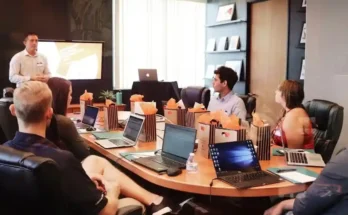Jobs used to be simple. You worked to earn money. You found something stable, stuck with it for years, retired with a pension, and looked back at a life well spent. But today, that narrative is being rewritten. In our fast-moving, hyper-connected world, a job is no longer just a paycheck. It’s a reflection of who we are, what we believe in, and where we hope to go.
The modern job landscape is transforming—radically. From the rise of remote work and gig culture to the growing demand for meaningful work, people are rethinking not just how they work, but why they work. In this new world of employment, traditional rules are being questioned, hierarchies are flattening, and self-fulfillment is taking center stage.
The Evolution of Work:
The concept of a job, as we know it today, began during the Industrial Revolution. Factories needed labor, and people needed stability. Jobs were structured, time-bound, and task-specific. The 9-to-5 workday was born, designed to balance production needs with human endurance. It was efficient, dependable, and, for many decades, the societal norm.
In this era, loyalty was rewarded. People stayed with one company for decades, often retiring with the gold watch and a farewell speech. Work-life balance wasn’t really a topic of discussion—it was simply work, and life happened after hours.
Then came the internet. Technology turned the world into a 24/7 marketplace and gave rise to new roles that didn’t exist even a decade ago—social media managers, data analysts, app developers, influencers, and remote consultants, to name a few. The boundaries between personal and professional began to blur, and the gig economy exploded. People realized that they didn’t have to sit in an office to be productive. Remote jobs opened the doors to flexibility, and freelancing became a legitimate career path. Suddenly, work could happen anywhere—a beach in Bali, a café in Prague, or the comfort of your living room.
What Do We Want From Work?
-
Purpose Over Pay
For generations, stability and income were the primary motivators for seeking a job. Today, while money still matters, purpose is becoming a powerful driver. More and more people are asking, “Does this job align with my values? Am I making a difference?”
Companies that offer a sense of mission—not just compensation—are attracting top talent. Whether it’s fighting climate change, promoting mental health, or driving social equity, people want their work to matter. They want to wake up each day feeling like they’re contributing to something larger than themselves.
-
Autonomy and Creative Freedom
Micromanagement and rigid schedules are fading fast. Workers today crave autonomy—the ability to decide how, when, and where they get things done. They want room to innovate, to create, to solve problems in their own way.
This is particularly true for Millennials and Gen Z, who place a high value on flexibility and work-life integration. They’re not lazy or entitled—they’re simply redefining productivity. For them, output matters more than hours, and creativity can’t be boxed into cubicles.
The Rise of the Passion Economy:
-
Turning Interests Into Income
There’s a new class of workers emerging: content creators, online educators, niche product makers, and digital entrepreneurs. Welcome to the passion economy, where people are building careers around the things they love. Whether it’s creating YouTube tutorials, selling handmade art on Etsy, or offering coaching sessions online, this economy is deeply personal.
What makes this different from traditional jobs is ownership. Individuals own their brand, their work, and their audience. It’s a model built not on climbing corporate ladders, but on carving out your own unique path.
-
The Risks and Rewards of Going Solo
Of course, the passion economy isn’t without its challenges. It can be unstable, competitive, and emotionally taxing. There’s no guaranteed paycheck, no HR department, and no safety net. But for many, the reward—doing what you love on your own terms—is worth the trade-off.
This entrepreneurial mindset is transforming how people view jobs. No longer limited to employment contracts, a “job” can now mean any consistent activity that creates value and sustains income, whether you’re hired or self-started.
The Human Side of Employment:
-
Mental Health and Workplace Culture
Mental health was once a taboo topic at work. Today, it’s central to the conversation. Companies are realizing that burnout, stress, and lack of support lead to low productivity and high turnover. Healthy workplace culture isn’t a luxury—it’s a necessity.
Employees now expect empathy, inclusion, and psychological safety from their employers. They want leaders who listen, policies that support well-being, and environments where they can be themselves without fear.
Work is no longer just about output; it’s about how people feel while doing it.
-
Diversity, Equity, and Inclusion
The best companies know that diverse teams create better ideas. But diversity isn’t just about checking boxes—it’s about cultivating real equity and inclusive leadership. Job seekers today look closely at company values, representation, and how inclusive their environments truly are.
The modern job is not just a task—it’s a cultural experience. And the culture of a workplace often matters as much, if not more, than the role itself.
The Future of Jobs:
As automation continues to take over repetitive tasks, jobs are becoming more human-centered. Creativity, emotional intelligence, problem-solving, and empathy are becoming the skills of the future. Rather than fearing job loss, forward-thinking professionals are learning how to collaborate with technology. The future of jobs isn’t man versus machine—it’s man working meaningfully alongside machines.
The pandemic accelerated a shift that was already coming. Hybrid work—part remote, part in-office—is becoming the norm. Companies are rethinking physical office spaces, redefining team dynamics, and learning how to maintain connection across distance. This model offers both freedom and structure, and it reflects the new priorities of workers: flexibility, autonomy, and trust.
Conclusion:
Jobs have changed, and with them, so have we. The old definitions no longer fit. A job is no longer just a function—it’s a form of self-expression, a path to impact, a part of identity.
As we move forward in this evolving landscape, the real question is not just “What do you do?” but “Why do you do it?” And in asking that question, we open the door to a new kind of work—one that not only sustains us, but inspires us.
Whether you’re clocking in at an office, freelancing from a cabin in the woods, or building a dream from scratch, remember: you’re not just earning a living. You’re building a life.




